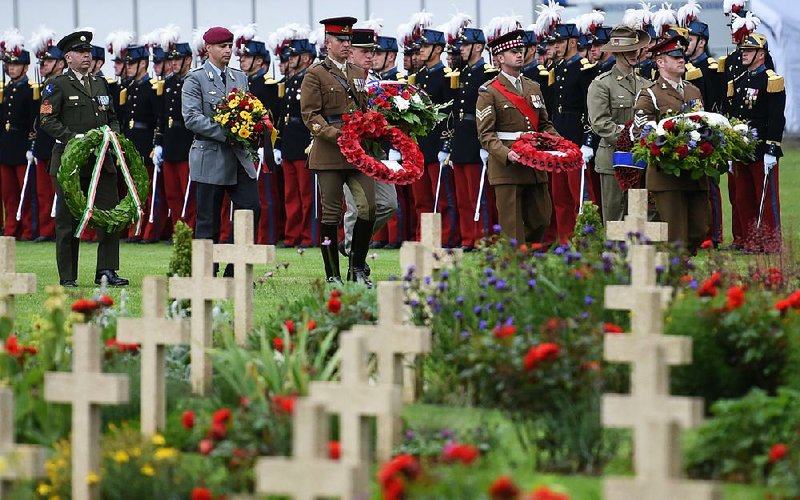THIEPVAL, France -- A week after Britain's vote to leave the European Union, British Prime Minister David Cameron and members of the royal family stood side by side with France's president to celebrate their alliance at the centenary of the deadliest battle of World War I.
More than a million people were killed, wounded or went missing in the Battle of the Somme in northern France, pitting British and French troops against German troops from July 1 to Nov. 18, 1916.
Britain held a moment of silence Friday morning to mark 100 years since the bloodiest day of British military history -- about 20,000 British soldiers alone were killed on the first day of battle.
The main ceremony began with the sound of cannon shots shortly after noon Friday at the monumental Memorial of Thiepval in northern France with the participation of 600 British and French children. Each of them laid a flower crown on the 600 British and French graves of the cemetery.
Many descendants of soldiers, often wearing poppy and cornflower pins -- the British and French symbols to remember those who died-- attended the event.
Guests and dignitaries, including French President Francois Hollande, Cameron and Britain's Prince Charles read from written accounts of the horrific scenes and the devastated landscapes of the front line in 1916.
French, British and Irish songs inspired by the war were sung later in the ceremony.
The Memorial of Thiepval, built in 1932 by the British government, is dedicated to the 73,367 British and South African soldiers who went missing in the Somme area during World War I. Thousands of petals of poppies and cornflowers fell from the top of the monument in silence.
No speeches were made during the ceremony, but Hollande and Cameron held brief informal talks after the event.
The two leaders used the occasion to stress their World War I alliance and show their attachment to the ideas underpinning European unity.
Commenting on the British vote, Hollande told reporters that the U.K. will "remain an ally and a partner of France."
"The decision has been made; it cannot be delayed or canceled. Now we must draw the consequences," he said.
Both leaders agreed that the relationship between Britain and France was "enduring and strong" and Cameron "reiterated his view that the United Kingdom should seek the closest possible relations with the EU and in that context, the need for constructive post-referendum negotiations," according to the prime minister's office.
Others at Friday's event included Prince Charles' wife Camilla, his sons Prince William and Prince Harry and William's wife Kate, Irish President Michael Higgins and former German President Horst Koehler.
British commuters were met by people dressed as WWI soldiers as they made their way to work on Friday. Young men in vintage uniforms sat, stood and mingled with travelers at railway stations across the country during the morning rush hour.
Some sang wartime songs, while others handed out cards bearing the names of the soldiers killed on the first day of the battle and the hashtag #wearehere.
Last month, Hollande and German Chancellor Angela Merkel together commemorated the centenary of the Battle of Verdun, the longest battle of World War I. The leaders praised their countries' friendship, risen from the ashes of two world wars and strengthened through EU cooperation.
Information for this article was contributed by Greg Katz and Jill Lawless of The Associated Press.
A Section on 07/02/2016
